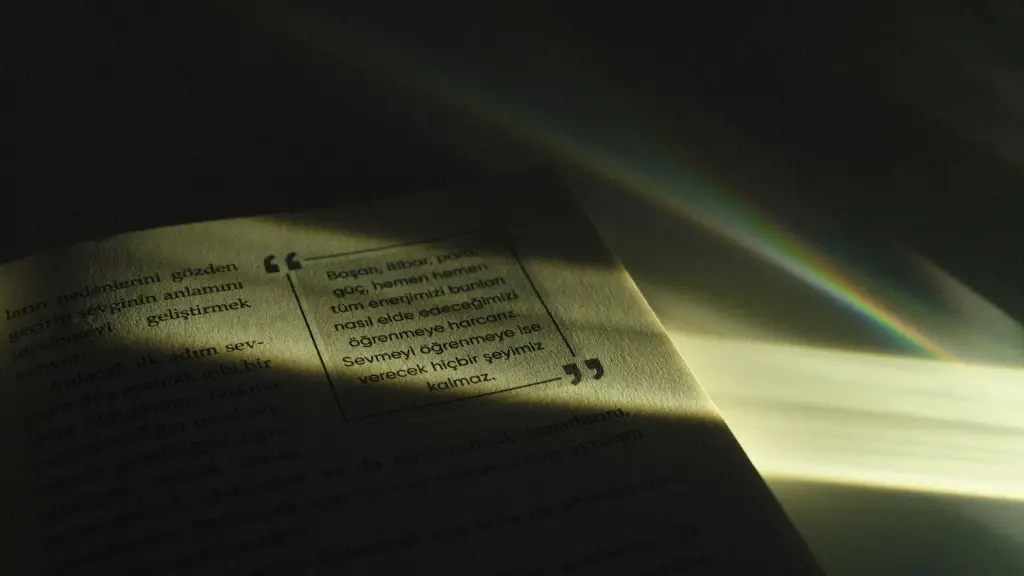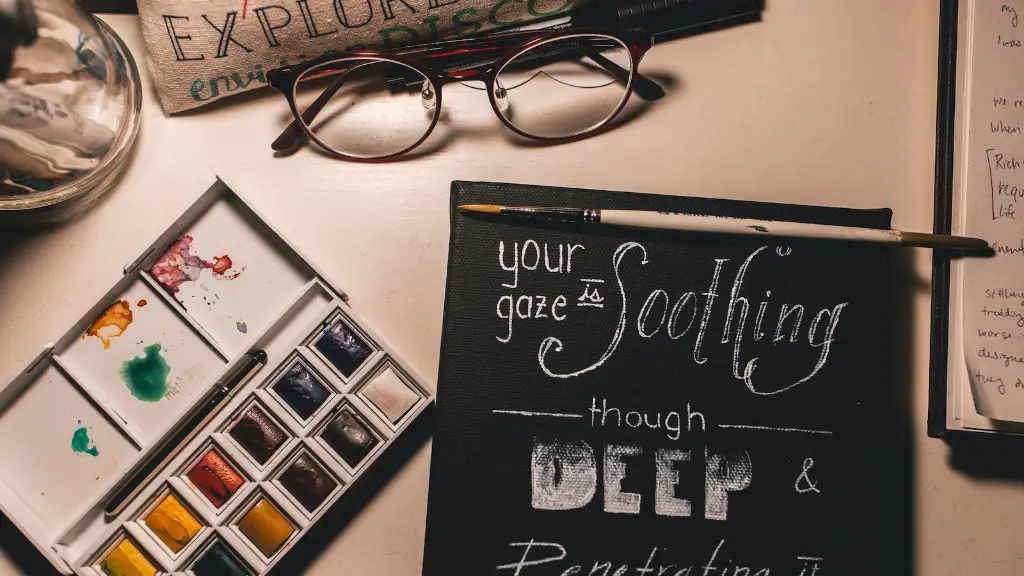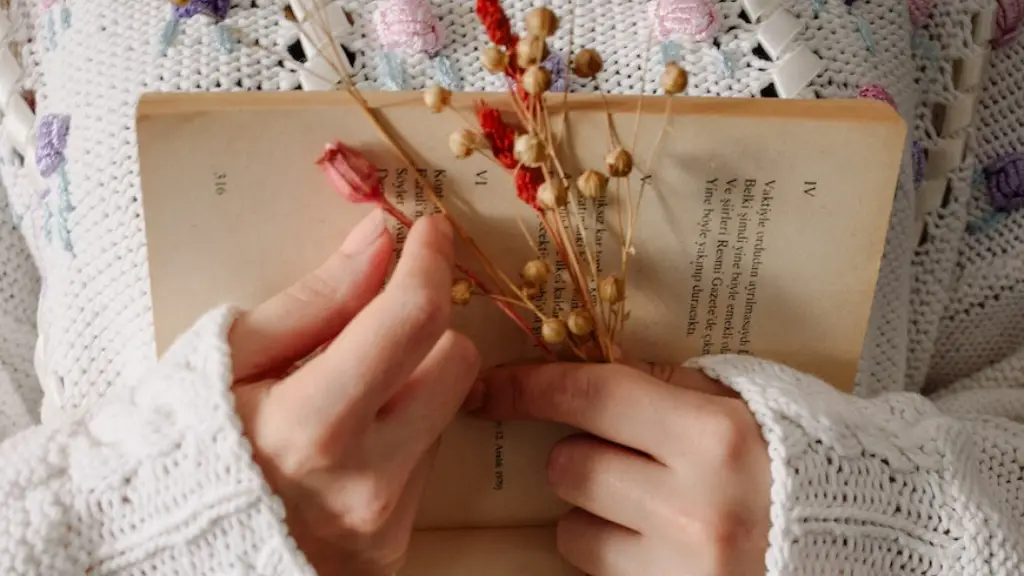Poetry is often seen as insubstantial or insignificant by those who have not experienced it, but its effects on the reader can be lasting and profound. Even at its most basic, poetry is far more than mere words – it captures emotion and stimulates empathy, allowing us to experience it in new and different ways. Even in a world where digital media and modern technology dominate, poetry stands out as a unique way to express ourselves, and can help us connect with our own feelings and emotions in ways that no other form of communication can.
The power of poetry lies in its ability to capture emotion, and to convey it to others. Most adults would agree that some poetry is emotionally charged, with the potential to evoke strong feelings in its readers. Recent studies have even suggested that some forms of poetry may have a positive impact on individuals’ mental health. Poetry can offer solace and understanding to those who are struggling with emotional issues. Being able to access these emotions in a safe and secure way can be empowering.
The traditional structure of a poem can also be helpful in unlocking feelings and experiences that we may not have been able to express before. While poetry is often seen as a way to express ideas, the structure of a poem can provide clarity and aid in self-reflection. By encouraging readers to dig deeper and explore the complexities of their own emotions and experiences, poetry can help individuals work through difficult times.
The beauty of poetry also lies in its universality. Ideas and feelings that may be unique to each individual can still be shared and understood through poetry. It is this universality that allows readers to connect with the poet’s emotions and to feel what they feel – it is a medium that helps us relate to others’ thoughts and experiences, and to empathise with them.
Finally, poetry can also be a powerful device for change. Poetry can speak to the heart and soul, and can be used to expose injustice and to challenge traditional thinking. For example, in the wake of the Black Lives Matter movement, many poets have used their work to express their anguish, anger, and urgency for change. By drawing attention to injustice, poetry can help to sparks conversations, bring awareness to pressing issues, and inspire action.
Politics and Poetry
Historically, poetry has been used to communicate political messages. From ancient Greece and Rome, to the early modern period, literary works often reflected the dominant political sentiments and beliefs of the author’s time. In more recent years, poets have continued to use their words to comment on the current political landscape, writing works to express their opinions and to call for action.
This type of poetry is often referred to as ‘protest poetry’ or ‘political poetry’, and it has the potential to be an incredibly powerful force for change. Protest poetry uses the power of words to call attention to the injustices of the world and to offer hope for a better future. From feminism to the LGBTQIA+ movement, these powerful pieces of writing can give a voice to the voiceless and help spark genuine change.
Poetry can also be used to transcend politics and to bring people together. Through sharing poems, individuals can connect over shared experiences or values, finding a common ground that transcends our differences. These shared experiences can in turn become a powerful tool for change and for creating a better society. By exploring the varied perspectives and worldviews contained in poetry, we can learn to truly listen to and understand each other.
Poetry can be used to empower and to bring hope, and in this way, it is an incredibly powerful tool for creating positive and lasting change. The reality is that words can be used to build bridges, to dismantle stereotypes and to challenge the status quo – and this is what makes poetry so important today.
Power of Words
The power of words cannot be understated, especially when it comes to poetry. Poetry can help us to better understand our emotions, to articulate our thoughts and feelings, and to connect with each other. Even in a world dominated by digital media, poetry stands out as a unique and powerful form of expression.
Poetry can transport us to different times and places, allowing us to explore our own individual experiences and to share those experiences with others. Through it, we can connect on an emotional level, inspiring us to ask questions and to challenge the status quo. Poetry can be deeply moving and empowering, providing solace and comfort in difficult moments, as well as sparking conversations and inspiring action.
The reality is that poetry has been a powerful tool for centuries, and it still remains relevant and powerful to this day. Whether for personal or collective gain, poetry has the potential to evoke emotion and to challenge traditional thinking. It is for these reasons that we must defend poetry and ensure that its power is not forgotten.
Education
Many schools and universities around the world are reviving the importance of poetry and its power to evoke emotion and to challenge traditional thinking. By teaching young people to appreciate poetry, they can develop a deeper understanding of themselves and of the complex world they live in.
Furthermore, poetry can also be used to develop soft skills such as communication, creativity and critical thinking. By reading and reflecting on the works of influential poets, young people can uncover the hidden meanings and gain a greater appreciation of how words can convey powerful messages.
Moreover, by making poetry more accessible and more engaging, students can develop a deeper understanding of their own emotions and experiences. Poetry can also help young people cultivate empathy and gain perspective on challenging topics, encouraging them to take ownership of their own feelings and to connect with others.
Ultimately, through education, we can ensure that the power of poetry is not forgotten, and that it remains an important source of reflection, connection and inspiration.
The Impact of Technology
With the rise of digital media, some have argued that poetry is becoming less relevant in our modern world. This could not be further from the truth – technology has in fact opened up whole new avenues for poetry, allowing it to be shared more easily and accessed by a wider audience. By using social media and other platforms, poets can share their works with the world and reaches people from all around the globe.
Social media has also drastically changed the way that we consume poetry, allowing us to engage with others over shared experiences and to discover different poets and their works. Web series and podcasts can also help to bring poetry to life, making it easier to digest and to connect with the words on a deeper level. Technology has also made it easier to find works of poetry in translation, giving international poets a platform to share their work and their stories.
In addition, websites and apps have made it easier for aspiring poets to publish their works and to find an audience. Open mic nights and slams have also become more accessible, empowering poets to take control of their own creative works and to speak their truth.
This shows that, far from becoming less relevant, poetry has in fact become more ubiquitous in our digital age. Technology has the potential to amplify a poet’s words and to help their work reach a larger audience than ever before.
Censorship
Unfortunately, as with all forms of expression, poetry is not immune to censorship. From oppressive regimes and religious restrictions, to individuals’ own prejudices, censorship is a reality for many poets around the world. This can have devastating consequences, as it limits individuals’ freedom to express themselves and to communicate their thoughts and feelings.
Governments also have a tendency to use censorship as a tool to suppress dissent, and this is particularly true in places where freedom of speech is limited. In these cases, poets have often resorted to ‘coded language’, using subtly indirect words and phrases to convey their messages. This type of ‘counter-censorship’ can be incredibly powerful, as it demonstrates the ingenuity and creativity of the poet.
At the same time, it is also important to remember that censorship is not limited to oppressive regimes. Self-censorship and internalised prejudices can also be incredibly limiting and damaging, silencing voices that should be heard. In this way, it is important that we take a stand against all forms of censorship, and defend poets’ rights to express themselves freely.
Conclusion
In a world where digital media and technology dominate, poetry still stands out as a unique source of expression. It has the power to evoke emotion, to challenge traditional thinking, and to offer comfort in difficult times. Poetry can also be used to share our experiences and to uncover new perspectives, allowing us to connect with each other and to find a common ground that transcends our differences.
Ultimately, poetry is an incredibly powerful tool for sparking conversations, conveying powerful messages and inspiring action. We must defend poetry and ensure that its power is not forgotten, ensuring that it remains an important source of reflection, connection and inspiration.





